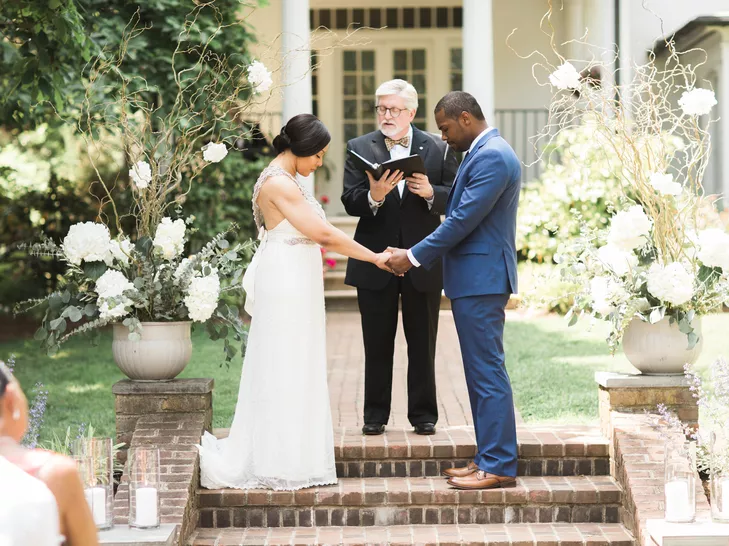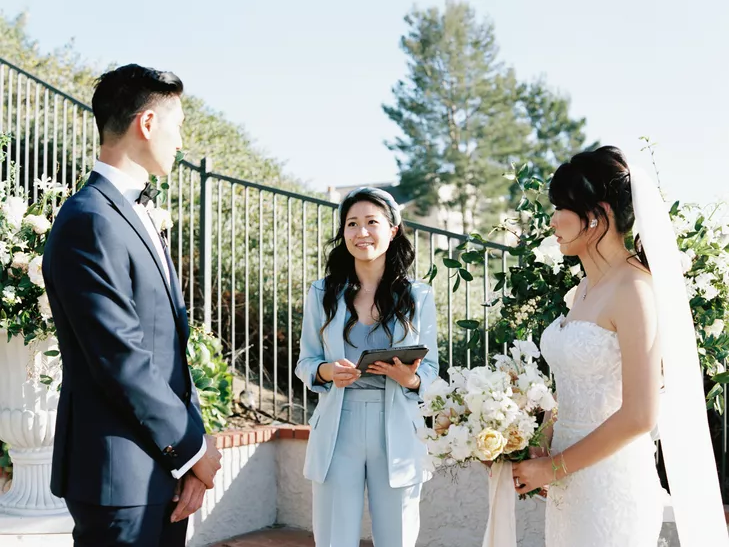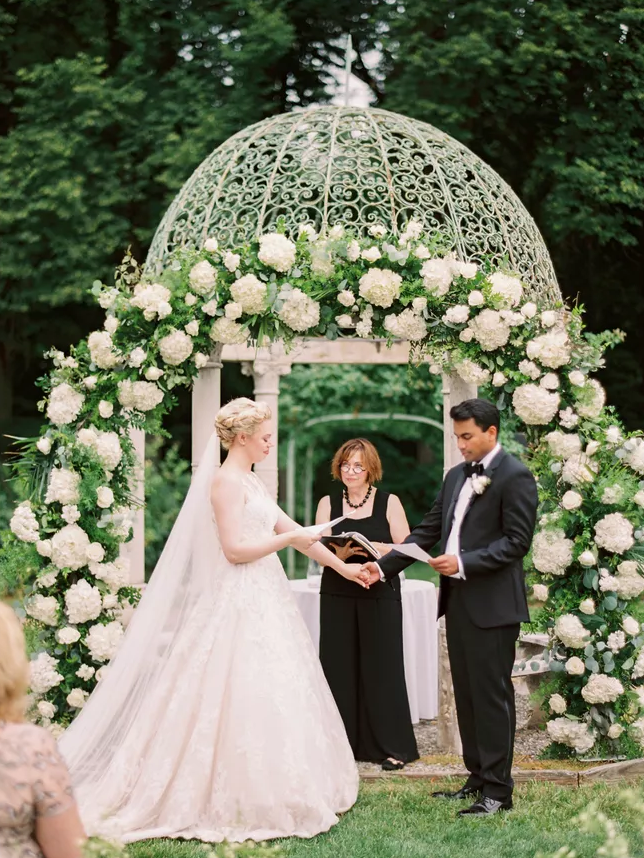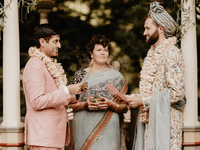33 Essential Questions to Ask an Officiant Before & During the Wedding
Your wedding ceremony will be one of the most memorable moments of your big day, so it's crucial to have an officiant who understands you and your partner. To support you through this important part of the wedding planning process, we compiled a list of questions to ask an officiant before booking, during the planning stage and on the wedding day. But we didn't do it on our own, we got help from two top-rated professional officiants so you could hear it straight from the source.
And don't forget to check out The Knot Vendor Marketplace if you haven't found your desired officiant. (Psst. That's also where you can find our amazing experts below.)
Questions to Ask an Officiant:
Background and Experience | Prewedding Logistics | Day-of Logistics | Personalization
Background and Experience Questions to Ask an Officiant
There are important questions to ask a wedding officiant before you sign your name on the dotted line. Below is everything you need to get answers to, according to professional officiants.
1. What do you do as an officiant?
If you're unfamiliar with what officiants do and their role during a wedding ceremony, this is a good first question. There are many different types of officiants, including life-cycle celebrants, professional wedding officiants, religious leaders, civil servants and much more. Generally, an officiant's duties include preparing a wedding ceremony, leading it on the big day, completing the legal paperwork and returning it to the issuing courthouse.
2. How did you get into the wedding business?
Christopher Shelley, a professional wedding officiant and life-cycle celebrant of Illuminating Ceremonies, recognizes it's a broad question but thinks it's vital to ask because it sheds light on the officiant's background. "Officiating a wedding is a unique kind of public speaking, as it involves more sensitive cultural, spiritual and personal subjects than most other kinds of speaking. Finding out why your potential officiant gravitated towards weddings will show you a lot about them as a person and show you what they will probably be like during your ceremony," Shelley explains.
3. What is your experience as a wedding officiant?
For just about any job, how much experience you have under your belt determines how qualified you are. Laura Cannon, owner of Ceremony Officiants and president of the IAPWO (International Association of Professional Wedding Officiants), gives more insight into the behind-the-scenes of becoming an officiant.
"Entering the profession is not difficult in many areas, so you'll find there's a wide variety in the experience levels of officiants in any area. There's a big difference between an experienced professional who has earned the CPWO (Certified Professional Wedding Officiant) credential and an officiant who has only performed a few ceremonies. And a massive difference between a professional and a friend or family member. It's important to know the officiant you choose is skilled at conducting ceremonies, handling unexpected situations and has enough first-hand knowledge of what works and what doesn't," Cannon advises.
4. How many weddings do you do in a year?
"The more experience, the better. Maybe they've been officiating for 10 years, but they only do a half-dozen a year. Maybe they've been officiating for three years, but they average 60 a year. That's a big difference," Shelley says.
5. Have guests come up to you after a wedding and made comments about the ceremony? If so, what have they said?
"If a ceremony is memorable and well delivered, guests will definitely say something to the officiant and the couple. The ceremony is the first impression of your wedding––the way your guests are left feeling after the ceremony sets the tone for their entire experience. Asking this question gives you a sense of the kind of experience you can expect you and your guests to have," Cannon says. Basically, you're asking your potential officiant what their reviews are.
6. What is your process like?
This is one of the first questions to ask your officiant because you'll learn how they work with to-be-weds. "The officiant has likely answered this question before, and the information provided will likely answer other subsequent questions the couple has. Good, experienced officiants know what couples want to be reassured about, so they'll do their best to reassure the couple pre-emptively," Shelley explains.
7. Have you dealt with unexpected or challenging situations during a ceremony? If not, what would your approach be?
"An experienced officiant will always have stories to tell. If you're interviewing a newer officiant, they may not have personally had someone pass out, get injured, been stuck in a torrential downpour or had a light fixture fall on guests during a ceremony (yes, that happened), but they should at least have a plan of what they would do in the most common 'unplanned situations,'" Cannon, with more than 15 years as a professional officiant, notes.
8. Have you worked at my wedding venue before?
This is one of our favorite questions to ask a potential wedding officiant because, depending on their answer, it could make the planning process easier. "It shouldn't be a 'deal breaker,' but it can be a helpful bonus if the officiant has previously worked at your venue. If they have, they likely know the staff, the rules and any logistical nuances you may want to consider, such as whether the sun is going to shine in your face at a certain time of day or whether there are particular ways to walk in or stand that work better than others," Cannon says.
9. Do you meet the legal requirements for an officiant at our wedding destination?
Before you get your heart set on your dream wedding officiant, ask this question to avoid any issues. Every state has varying marriage license laws, which include who's authorized to sign the legal paperwork. Before signing the wedding officiant contract, look at the requirements for your specific destination (local or abroad).
10. What do you love about your job?
"This should get you to see what this person looks like when their soul is lit up. Plus, it will tell you loads about how dedicated they'll be towards creating an incredible experience for you," Shelley confesses.
11. What is your fee, and what does it include?
Knowing the cost of a wedding officiant is essential for creating your wedding budget because you can set money aside for the person you want. "The more experienced and in-demand an officiant is, the higher their fee will likely be. The most important thing to consider is the value you place on the ceremony, not only as the official beginning of your marriage but also as the first impression your guests will have of your wedding day," Cannon says.
"When choosing an officiant, the personal style and connection with this human being doing this very human service for you is much more important than the rate. Officiants are [usually] the lowest pie-wedge of the wedding budget...," Shelley adds.
Prewedding Logistics Questions to Ask an Officiant
Now that you've chosen your desired officiant, there's information you need to discuss in the days leading up to your special day. Check out these 15 questions to ask a wedding officiant during your periodic check-ins.
12. What time will you arrive at the venue on the wedding day?
Having enough time to prep with the officiant before the ceremony is important. "Good officiants know to arrive at least 90 minutes before a ceremony starts to have time to connect and coordinate with the other vendors, get used to the space, do a mic check and maybe run a same-day rehearsal. If they tell you they show up 20 minutes before the ceremony starts, either don't hire them or if you've already hired them, request that they show up earlier," Shelley, The Knot Best of Weddings Hall of Fame Winner, shares.
13. What's your advice on the best way to walk down the aisle?
"While there's no right and wrong way to walk down the aisle, a professional officiant will know how to advise you based on their experience. There are several different approaches to ceremony entrances, and it depends on a variety of factors, such as your preference, the surface of the ground (think heels on cobblestone or wet grass), the layout of the ceremony space and the number of attendants on either side," Cannon explains.

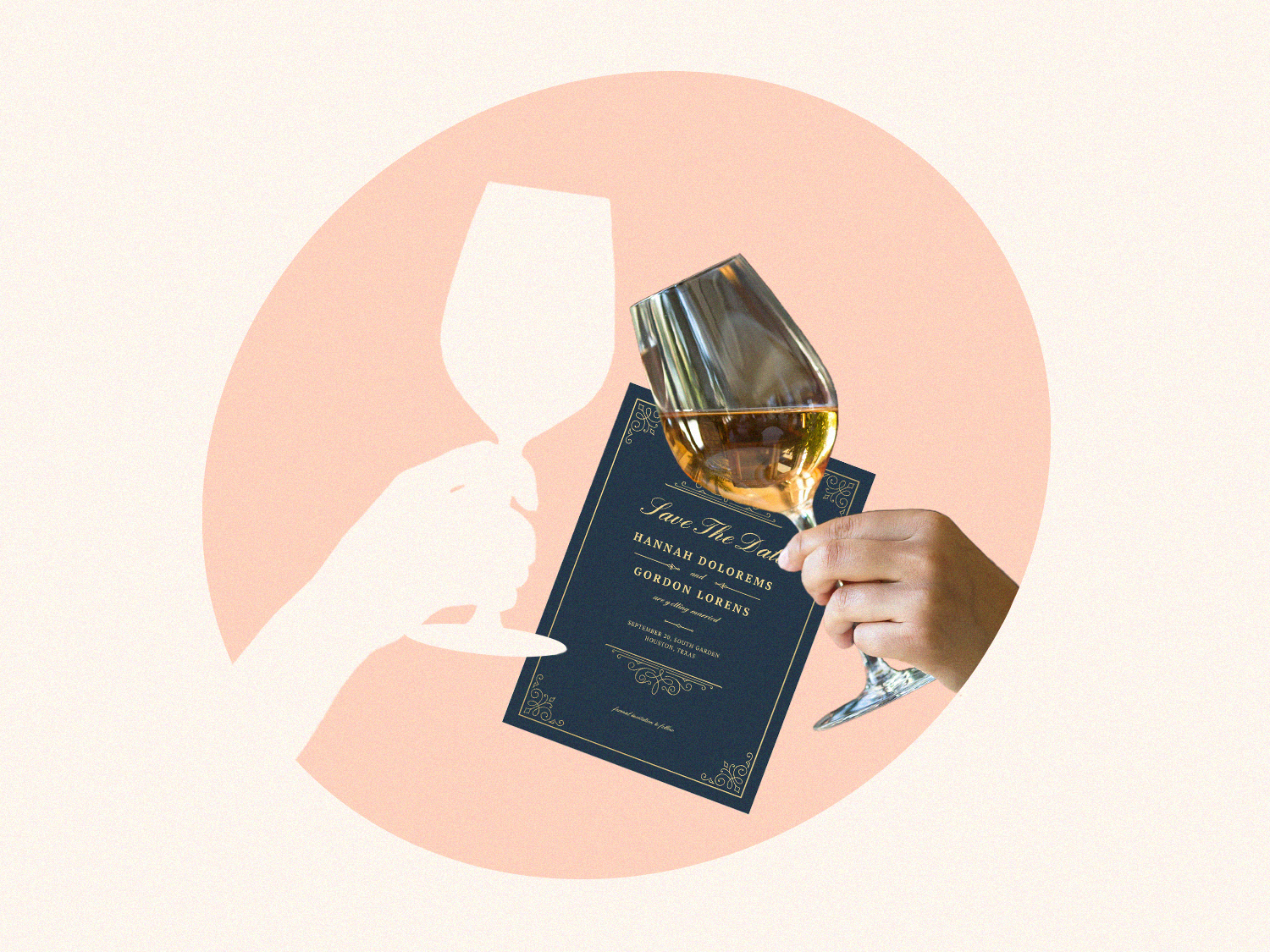
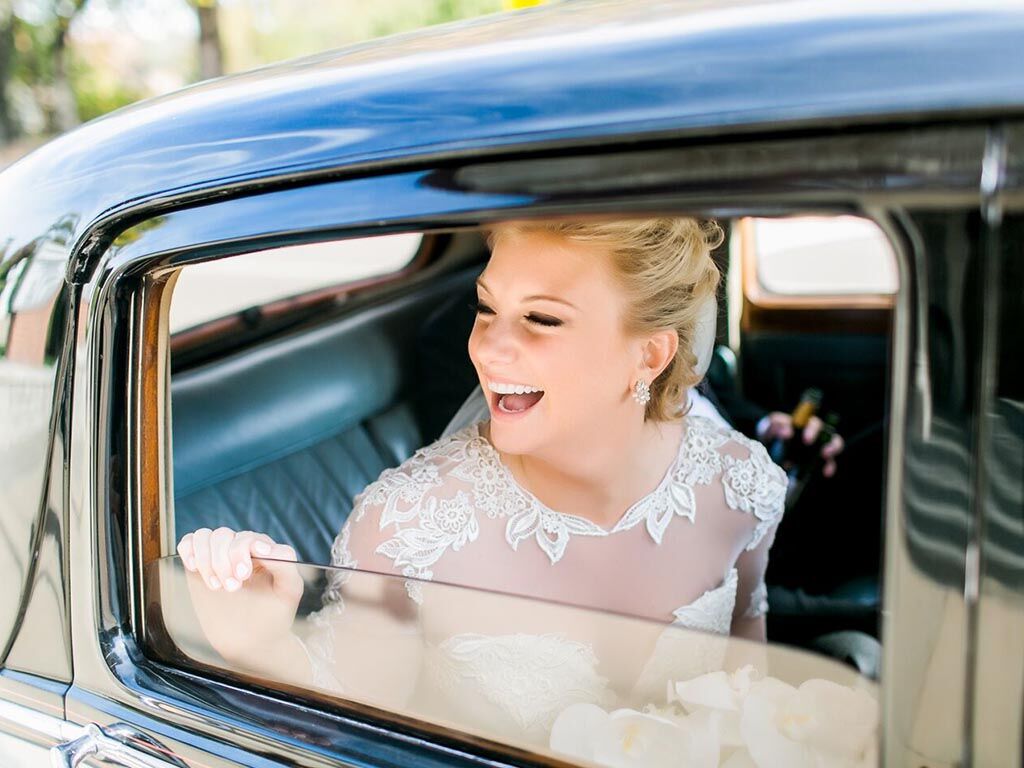
14. How long will the ceremony take?
Every couple is different. Some want a quick ceremony, while others may want to savor the experience and tell their love story. Ask the officiant how long the ceremony will be to ensure their style matches your vision and goes well with your wedding day timeline.
15. Can we see the ceremony script before the wedding?
Unless you want to be surprised by what the officiant says during your wedding, ask them what their ceremony script is. "Some officiants only share part of the ceremony script, leaving the 'love story' a surprise for the couple during the ceremony. This is a big risk, and robs the couple of the ownership they deserve over their own story. Some officiants never show scripts at all. This question will show the couple whether this officiant is aligned with their comfort levels regarding the script," Shelley says.
16. Can you give us guidance on writing our vows?
If writing your own vows is in your plans, try using our handy wedding vows template and ask your professional officiant for tips on structuring them. "It's also important you talk through expectations around the time each person will spend sharing their vows, so one person isn't speaking significantly longer than the other," Cannon advises.
17. Will you attend the rehearsal?
Some officiants don't feel the need to attend rehearsals, while others like being there. By asking this question, you know whether or not your wedding planner or venue coordinator needs to be present to help lead the ceremony run-through. Plus, couples shouldn't be in charge of the rehearsal because it tends to make the experience chaotic.
18. Are there things couples request you don't think work in a wedding ceremony?
This is one of the most unique questions to ask your officiant. Cannon suggests inquiring about this because your pro can let you know about out-of-style trends, warn you that your family member singing for five minutes isn't the best use of time and, overall, give you valuable insight.
19. What do we need to bring to the ceremony?
Even if you're having a simple ceremony, that doesn't mean you aren't responsible for bringing key items. "Typically, you'll need to bring your marriage license, wedding rings and any props required for your ceremony. However, if you have anyone giving readings during the ceremony, make sure to ask whether or not you need to bring a printed copy for them to read from or if the officiant has another way to handle that," Cannon says.
20. How do you handle the marriage license logistics?
Getting your marriage license involves various rules and paperwork. Ask your officiant what steps are required for your celebration. Some questions that go under this umbrella are: Do I need witnesses?, Who needs to sign what? and Who takes the document to the state/county clerk's office?
21. Do you provide your own amplification?
"It's pretty standard for DJs and venues to provide amplification. If the officiant has their own, it'll be useful for the venue and DJ to know about it so they can coordinate equipment and technology," Shelley says.
22. What are you going to wear to the ceremony?
"If what they typically wear doesn't suit your wedding dress code, it's okay to describe more suitable attire to see if they have something more coordinated. However, if they don't, and you require them to wear something they don't own, it's up to the couple to pay for the attire," Cannon says.
23. Would you be willing to speak with us and our musicians to discuss the musical vibe for the wedding ceremony?
"There are lots of logistics involved with picking the right wedding ceremony music, and officiants and DJs will have seen lots of iterations of entrances. Good DJs and officiants can play off each other during ceremonies but don't just leave them to do their own thing. Create a team with them and trust their creativity and experience—same for musicians and officiants," Shelley advises.
24. Are you planning to stay for the wedding reception?
Since the officiant is only at the wedding for a couple of hours, typically, giving them a wedding vendor meal isn't expected. Some couples invite their officiant to the reception as a way of saying thank you for their services. We suggest asking this question to get an accurate headcount for the reception and avoid any confusion.
25. Can we contact you if we have any questions?
"Some officiants charge for extra phone calls and meetings—not making that up. Your officiant should be a resource for wedding ceremony information for you. Never abuse professional courtesy, so only contact your officiant during reasonable business hours. This question will let you know how much you need to get out of each meeting," Shelley says.
26. What's the game plan if an incident happens to you before the wedding?
Unfortunately, things come up, and bad things can happen right before the wedding. The officiant (and all your vendors) should have a plan for emergencies.
Day-of Logistics Questions to Ask an Officiant
You're so close to saying "I do," you can hear the faint sound of wedding bells in the back of your head, but there are just a few more things to check off before you reach the finish line. Here are six simple questions to ask your wedding officiant.
27. Will you ask guests not to take photos or videos during the ceremony?
To-be-weds who want an unplugged wedding, this question is for you. "This should have come up in the ceremony-creating process, but if it didn't, consider asking your officiant to make housekeeping announcements at the beginning of the ceremony," Shelley says.
28. Would you like to meet the reader(s)?
Organize a quick meet and greet with the officiant and your ceremony reader(s) before starting. This way confirm they have the correct copy of the reading, show them how to use the microphone and any other instructions the officiant finds necessary.
29. Are there any specific instructions you have for us during the ceremony?
"For example, this is when I remind my couples that when repeating after me or saying their vows, they should look at their partner, not me. This is also when the officiant can give specific instructions about where to stand or where the microphones are. It's a great last-minute check-in to ensure everyone is on the same page and ready to get hitched," Cannon notes.
30. Can I introduce you to everyone?
"This is just basic human politeness, People Skills 101. Chances are, your officiant has only met the couple. As such, it is the couple's responsibility to graciously introduce the officiant to the family and wedding party," Shelley encourages.
31. What must we do after the wedding to ensure we're legally married?
You need to understand what other necessary next steps are required so your marriage is recorded legally. For example, some states don't automatically change a person's last name after they're married. You'll need a "certified copy" of your marriage certificate to change your name.
Personalization Questions to Ask an Officiant
More and more couples are ensuring every aspect of their wedding is special to them. If personalizing your ceremony is important to you, these are the top questions to ask the officiant.
32. Are we able to customize our ceremony so it feels like a reflection of us?
"You want to ensure your ceremony is an accurate reflection of the two of you and your unique relationship. Some officiants may have their own requirements about what must be in a ceremony. That's why it's important to ask if there's anything they aren't willing to include or require you to include in the ceremony," Cannon says.
33. Are you able to perform rituals important to us?
Whether you decide to have a nondenominational wedding ceremony or an interfaith or intercultural wedding ceremony, this is an important question to ask. If you and your soon-to-be spouse want to incorporate specific cultural or religious rituals into your wedding ceremony, like breaking the glass, exchanging garlands or saying prayers, you'll want to ensure your officiant can properly administer those rites and lead the rituals authentically.
